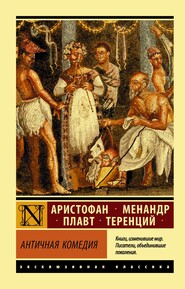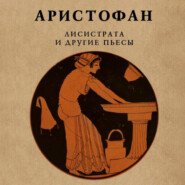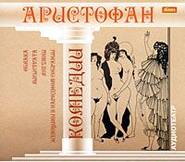По всем вопросам обращайтесь на: info@litportal.ru
(©) 2003-2024.
✖
The Eleven Comedies, Volume 2
Автор
Год написания книги
2018
Настройки чтения
Размер шрифта
Высота строк
Поля
PISTHETAERUS. We accept the omen.
EPOPS. Come in here.
PISTHETAERUS. Very well, 'tis you who lead us and must introduce us.
EPOPS. Come then.
PISTHETAERUS. Oh! my god! do come back here. Hi! tell us how we are to follow you. You can fly, but we cannot.
EPOPS. Well, well.
PISTHETAERUS. Remember Aesop's fables. It is told there, that the fox fared very ill, because he had made an alliance with the eagle.
EPOPS. Be at ease. You shall eat a certain root and wings will grow on your shoulders.
PISTHETAERUS. Then let us enter. Xanthias and Manes,[244 - Servants of Pisthetaerus and Euelpides.] pick up our baggage.
CHORUS. Hi! Epops! do you hear me?
EPOPS. What's the matter?
CHORUS. Take them off to dine well and call your mate, the melodious Procné, whose songs are worthy of the Muses; she will delight our leisure moments.
PISTHETAERUS. Oh! I conjure you, accede to their wish; for this delightful bird will leave her rushes at the sound of your voice; for the sake of the gods, let her come here, so that we may contemplate the nightingale.[245 - It has already been mentioned that, according to the legend followed by Aristophanes, Procné had been changed into a nightingale and Philomela into a swallow.]
EPOPS. Let it be as you desire. Come forth, Procné, show yourself to these strangers.
PISTHETAERUS. Oh! great Zeus! what a beautiful little bird! what a dainty form! what brilliant plumage![246 - The actor, representing Procné, was dressed out as a courtesan, but wore the mask of a bird.]
EUELPIDES. Do you know how dearly I should like to split her legs for her?
PISTHETAERUS. She is dazzling all over with gold, like a young girl.[247 - Young unmarried girls wore golden ornaments; the apparel of married women was much simpler.]
EUELPIDES. Oh! how I should like to kiss her!
PISTHETAERUS. Why, wretched man, she has two little sharp points on her beak.
EUELPIDES. I would treat her like an egg, the shell of which we remove before eating it; I would take off her mask and then kiss her pretty face.
EPOPS. Let us go in.
PISTHETAERUS. Lead the way, and may success attend us.
CHORUS. Lovable golden bird, whom I cherish above all others, you, whom I associate with all my songs, nightingale, you have come, you have come, to show yourself to me and to charm me with your notes. Come, you, who play spring melodies upon the harmonious flute,[248 - The actor, representing Procné, was a flute-player.] lead off our anapaests.[249 - The parabasis.]
Weak mortals, chained to the earth, creatures of clay as frail as the foliage of the woods, you unfortunate race, whose life is but darkness, as unreal as a shadow, the illusion of a dream, hearken to us, who are immortal beings, ethereal, ever young and occupied with eternal thoughts, for we shall teach you about all celestial matters; you shall know thoroughly what is the nature of the birds, what the origin of the gods, of the rivers, of Erebus, and Chaos; thanks to us, Prodicus[250 - A sophist of the island of Ceos, a disciple of Protagoras, as celebrated for his knowledge as for his eloquence. The Athenians condemned him to death as a corrupter of youth in 396 B.C.] will envy you your knowledge.
At the beginning there was only Chaos, Night, dark Erebus, and deep Tartarus. Earth, the air and heaven had no existence. Firstly, black-winged Night laid a germless egg in the bosom of the infinite deeps of Erebus, and from this, after the revolution of long ages, sprang the graceful Eros with his glittering golden wings, swift as the whirlwinds of the tempest. He mated in deep Tartarus with dark Chaos, winged like himself, and thus hatched forth our race, which was the first to see the light. That of the Immortals did not exist until Eros had brought together all the ingredients of the world, and from their marriage Heaven, Ocean, Earth and the imperishable race of blessed gods sprang into being. Thus our origin is very much older than that of the dwellers in Olympus. We are the offspring of Eros; there are a thousand proofs to show it. We have wings and we lend assistance to lovers. How many handsome youths, who had sworn to remain insensible, have not been vanquished by our power and have yielded themselves to their lovers when almost at the end of their youth, being led away by the gift of a quail, a waterfowl, a goose, or a cock.[251 - Lovers were wont to make each other presents of birds. The cock and the goose are mentioned, of course, in jest.]
And what important services do not the birds render to mortals! First of all, they mark the seasons for them, springtime, winter, and autumn. Does the screaming crane migrate to Libya,—it warns the husbandman to sow, the pilot to take his ease beside his tiller hung up in his dwelling,[252 - i.e. that it gave notice of the approach of winter, during which season the Ancients did not venture to sea.] and Orestes[253 - A notorious robber.] to weave a tunic, so that the rigorous cold may not drive him any more to strip other folk. When the kite reappears, he tells of the return of spring and of the period when the fleece of the sheep must be clipped. Is the swallow in sight? All hasten to sell their warm tunic and to buy some light clothing. We are your Ammon, Delphi, Dodona, your Phoebus Apollo.[254 - Meaning, "We are your oracles."—Dodona was an oracle in Epirus.—The temple of Zeus there was surrounded by a dense forest, all the trees of which were endowed with the gift of prophecy; both the sacred oaks and the pigeons that lived in them answered the questions of those who came to consult the oracle in pure Greek.] Before undertaking anything, whether a business transaction, a marriage, or the purchase of food, you consult the birds by reading the omens, and you give this name of omen[255 - The Greek word for omen is the same as that for bird—[Greek: ornis].] to all signs that tell of the future. With you a word is an omen, you call a sneeze an omen, a meeting an omen, an unknown sound an omen, a slave or an ass an omen.[256 - A satire on the passion of the Greeks for seeing an omen in everything.] Is it not clear that we are a prophetic Apollo to you? If you recognize us as gods, we shall be your divining Muses, through us you will know the winds and the seasons, summer, winter, and the temperate months. We shall not withdraw ourselves to the highest clouds like Zeus, but shall be among you and shall give to you and to your children and the children of your children, health and wealth, long life, peace, youth, laughter, songs and feasts; in short, you will all be so well off, that you will be weary and satiated with enjoyment.
Oh, rustic Muse of such varied note, tio, tio, tio, tiotinx, I sing with you in the groves and on the mountain tops, tio, tio, tio, tio, tiotinx.[257 - An imitation of the nightingale's song.] I pour forth sacred strains from my golden throat in honour of the god Pan,[258 - God of the groves and wilds.] tio, tio, tio, tiotinx, from the top of the thickly leaved ash, and my voice mingles with the mighty choirs who extol Cybelé on the mountain tops,[259 - The 'Mother of the Gods'; roaming the mountains, she held dances, always attended by Pan and his accompanying rout of Fauns and Satyrs.] tototototototototinx. 'Tis to our concerts that Phrynicus comes to pillage like a bee the ambrosia of his songs, the sweetness of which so charms the ear, tio, tio, tio, tio, tinx.
If there be one of you spectators who wishes to spend the rest of his life quietly among the birds, let him come to us. All that is disgraceful and forbidden by law on earth is on the contrary honourable among us, the birds. For instance, among you 'tis a crime to beat your father, but with us 'tis an estimable deed; it's considered fine to run straight at your father and hit him, saying, "Come, lift your spur if you want to fight."[260 - An allusion to cock-fighting; the birds are armed with brazen spurs.] The runaway slave, whom you brand, is only a spotted francolin with us.[261 - An allusion to the spots on this bird, which resemble the scars left by a branding iron.] Are you Phrygian like Spintharus?[262 - He was of Asiatic origin, but wished to pass for an Athenian.] Among us you would be the Phrygian bird, the goldfinch, of the race of Philemon.[263 - Or Philamnon, King of Thrace; the Scholiast remarks that the Phrygians and the Thracians had a common origin.] Are you a slave and a Carian like Execestides? Among us you can create yourself forefathers;[264 - The Greek word here, [Greek: pappos], is also the name of a little bird.] you can always find relations. Does the son of Pisias want to betray the gates of the city to the foe? Let him become a partridge, the fitting offspring of his father; among us there is no shame in escaping as cleverly as a partridge.
So the swans on the banks of the Hebrus, tio, tio, tio, tio, tiotinx, mingle their voices to serenade Apollo, tio, tio, tio, tio, tiotinx, flapping their wings the while, tio, tio, tio, tio, tiotinx; their notes reach beyond the clouds of heaven; all the dwellers in the forests stand still with astonishment and delight; a calm rests upon the waters, and the Graces and the choirs in Olympus catch up the strain, tio, tio, tio, tio, tiotinx.
There is nothing more useful nor more pleasant than to have wings. To begin with, just let us suppose a spectator to be dying with hunger and to be weary of the choruses of the tragic poets; if he were winged, he would fly off, go home to dine and come back with his stomach filled. Some Patroclides in urgent need would not have to soil his cloak, but could fly off, satisfy his requirements, and, having recovered his breath, return. If one of you, it matters not who, had adulterous relations and saw the husband of his mistress in the seats of the senators, he might stretch his wings, fly thither, and, having appeased his craving, resume his place. Is it not the most priceless gift of all, to be winged? Look at Diitrephes![265 - A basket-maker who had become rich.—The Phylarchs were the headmen of the tribes, [Greek: Phulai]. They presided at the private assemblies and were charged with the management of the treasury.—The Hipparchs, as the name implies, were the leaders of the cavalry; there were only two of these in the Athenian army.] His wings were only wicker-work ones, and yet he got himself chosen Phylarch and then Hipparch; from being nobody, he has risen to be famous; 'tis now the finest gilded cock of his tribe.[266 - He had now become a senator, member of the [Greek: Boul_e].]
PISTHETAERUS. Halloa! What's this? By Zeus! I never saw anything so funny in all my life.[267 - Pisthetaerus and Euelpides now both return with wings.]
EUELPIDES. What makes you laugh?
PISTHETAERUS. 'Tis your bits of wings. D'you know what you look like? Like a goose painted by some dauber-fellow.
EUELPIDES. And you look like a close-shaven blackbird.
PISTHETAERUS. 'Tis ourselves asked for this transformation, and, as Aeschylus has it, "These are no borrowed feathers, but truly our own."[268 - Meaning, 'tis we who wanted to have these wings.—The verse from Aeschylus, quoted here, is taken from 'The Myrmidons,' a tragedy of which only a few fragments remain.]
EPOPS. Come now, what must be done?
PISTHETAERUS. First give our city a great and famous name, then sacrifice to the gods.
EUELPIDES. I think so too.
EPOPS. Let's see. What shall our city be called?
PISTHETAERUS. Will you have a high-sounding Laconian name? Shall we call it Sparta?
EUELPIDES. What! call my town Sparta? Why, I would not use esparto for my bed,[269 - The Greek word signified the city of Sparta, and also a kind of broom used for weaving rough matting, which served for the beds of the very poor.] even though I had nothing but bands of rushes.
PISTHETAERUS. Well then, what name can you suggest?
EUELPIDES. Some name borrowed from the clouds, from these lofty regions in which we dwell—in short, some well-known name.
PISTHETAERUS. Do you like Nephelococcygia?[270 - A fanciful name constructed from [Greek: nephel_e], a cloud, and [Greek: kokkux], a cuckoo; thus a city of clouds and cuckoos.—Wolkenkukelheim [Transcriber's note: So in original. The correct German word is Wolkenkuckucksheim] is a clever approximation in German. Cloud-cuckoo-town, perhaps, is the best English equivalent.]
EPOPS. Oh! capital! truly 'tis a brilliant thought!
EUELPIDES. Is it in Nephelococcygia that all the wealth of Theogenes[271 - He was a boaster nicknamed [Greek: Kapnos], smoke, because he promised a great deal and never kept his word.] and most of Aeschines'[272 - Also mentioned in 'The Wasps.'] is?
PISTHETAERUS. No, 'tis rather the plain of Phlegra,[273 - Because the war of the Titans against the gods was only a fiction of the poets.] where the gods withered the pride of the sons of the Earth with their shafts.
EUELPIDES. Oh! what a splendid city! But what god shall be its patron? for whom shall we weave the peplus?[274 - A sacred cloth, with which the statue of Athené in the Acropolis was draped.]
PISTHETAERUS. Why not choose Athené Polias?[275 - Meaning, to be patron-goddess of the city. Athené had a temple of this name.]
EUELPIDES. Oh! what a well-ordered town 'twould be to have a female deity armed from head to foot, while Clisthenes[276 - An Athenian effeminate, frequently ridiculed by Aristophanes.] was spinning!











